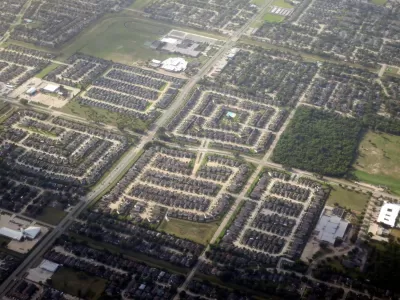Strengthening U.S. Department of Housing and Urban Development's civil rights enforcement could send a powerful signal to communities resistant to changing discriminatory housing rules.

A quick glance at current statistics shows the stark and continuing legacy of housing discrimination policies in American cities, writes Jerusalem Demsas for Vox. Studies show that "moving to a wealthier neighborhood not only increased the likelihood that kids would go to college, but also increased earnings by roughly 31 percent by the time they’d reached their mid-20s." Yet neighborhoods remain largely segregated, with many areas inaccessible to the average family.
Exclusionary policies like single-family zoning play a major role in keeping lower-income families from moving into suburbs and certain neighborhoods, and a recent reckoning with the discriminatory origins and harmful effects of these policies has led many cities to revise single-family zoning laws. In the Nashville suburb of Franklin, single-family zoning and a minimum lot size of (in some areas) two acres has kept the neighborhood overwhelmingly white and wealthy. Local officials recognize the problem, and have shifted their focus to approving more multi-family developments. According to the city, "in 2020 they approved only 4.9 percent of proposed single family home developments but 69 percent of proposed apartments." While some communities are already taking similar steps, others have expressed resistance to changing zoning codes in favor of more density.
Demsas provides a number of recommendations that can shift housing policy in more cities toward achieving the goals of the Fair Housing Act. If all else fails, Demsas writes, "sue the suburbs." The Biden administration should "open up the floodgates for civil rights organizations, developers, and its own Justice Department to begin suing the worst offenders of exclusionary zoning." The first step in this process is staffing up the Department of Housing and Urban Development's (HUD) Office of Fair Housing and Equal Opportunity, which is currently "lacking the kind of expertise that will be needed to in order to dig into civil rights enforcement and compliance," according to Sara Pratt, former deputy assistant secretary for fair housing enforcement and programs and senior adviser to the assistant secretary at HUD during the Obama administration.
While lawsuits are "a last resort," setting up the infrastructure for them can send a signal that the administration is serious about enforcement and could "deter other localities against exclusionary zoning practices and encourage them to work with HUD to develop a plan that fits their localities’ needs."
FULL STORY: America’s racist housing rules really can be fixed

Alabama: Trump Terminates Settlements for Black Communities Harmed By Raw Sewage
Trump deemed the landmark civil rights agreement “illegal DEI and environmental justice policy.”

Study: Maui’s Plan to Convert Vacation Rentals to Long-Term Housing Could Cause Nearly $1 Billion Economic Loss
The plan would reduce visitor accommodation by 25% resulting in 1,900 jobs lost.

Planetizen Federal Action Tracker
A weekly monitor of how Trump’s orders and actions are impacting planners and planning in America.

Wind Energy on the Rise Despite Federal Policy Reversal
The Trump administration is revoking federal support for renewable energy, but demand for new projects continues unabated.

Passengers Flock to Caltrain After Electrification
The new electric trains are running faster and more reliably, leading to strong ridership growth on the Bay Area rail system.

Texas Churches Rally Behind ‘Yes in God’s Back Yard’ Legislation
Religious leaders want the state to reduce zoning regulations to streamline leasing church-owned land to housing developers.
Urban Design for Planners 1: Software Tools
This six-course series explores essential urban design concepts using open source software and equips planners with the tools they need to participate fully in the urban design process.
Planning for Universal Design
Learn the tools for implementing Universal Design in planning regulations.
Caltrans
Smith Gee Studio
Institute for Housing and Urban Development Studies (IHS)
City of Grandview
Harvard GSD Executive Education
Toledo-Lucas County Plan Commissions
Salt Lake City
NYU Wagner Graduate School of Public Service




























